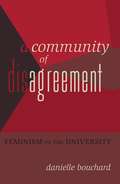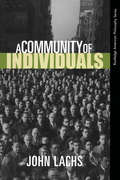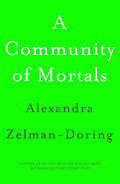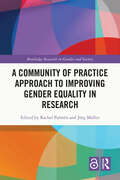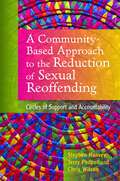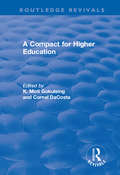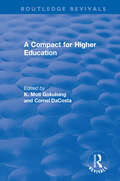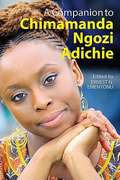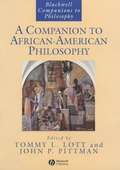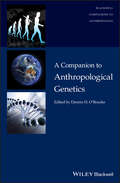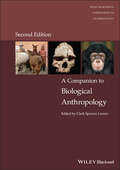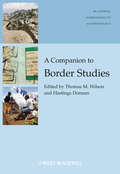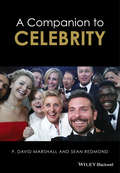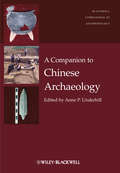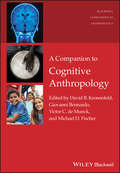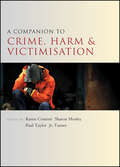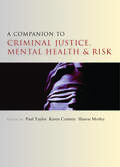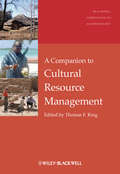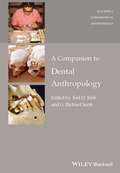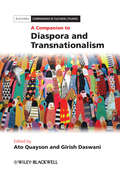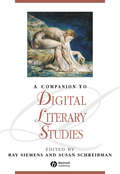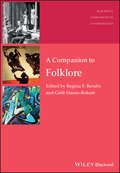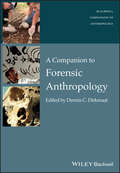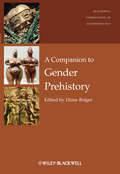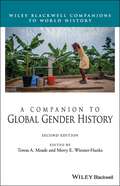- Table View
- List View
A Community Of Disagreement: Feminism In The University
by Danielle BouchardAs academic feminism has critiqued the often-violent inscriptions of institutionality, it has also produced a narrative of its role in the university fraught with difficulties of its own. The understanding of difference - as an object to be agreed upon and as the foundation for a diversity model of inclusion - that has emerged as the defining feature of this narrative has also come to serve as the suture point between feminism and the university, a site of presumed resistance to institutionality. Engaging in a close reading of the literature on the current state of academic feminism as well as a variety of bureaucratic, organizational, and scholarly texts on the US university, Danielle Bouchard draws from contemporary political philosophy, postcolonial and women of color feminisms, and poststructuralist social theory in order to examine feminism's relationship to what has become one of the central missions of the US university: the management of difference. Proposing that the possibility of imagining alternative university formations rests on a difference that cannot be fully accounted for, Dr. Bouchard understands feminism as a community of disagreement, a formation that resists political resolution and interpretive closure.
A Community of Individuals
by John LachsFirst published in 2003. Routledge is an imprint of Taylor & Francis, an informa company.
A Community of Mortals
by Alexandra Zelman-DoringWhat is it like to have someone die in your arms? Can we return from the dead? And why has nobody heard of therapeutic hypothermia? Forced to come to terms with doctors pronouncing her husband ‘clinically dead’, Alexandra Zelman-Doring embarks on an exploration of what death means to us and how we might face it. Initally she is overwhelmed by the difficulty of accepting the loss of a loved one, and the anger, sadness and sense of isolation that it brings. But her suffering pushes her towards a life-store of reading, and here she finds words with which to contemplate death; from Turgenev on death as an ‘unanswerable reproach’ to Norbert Elias on the extraordinary collective will to endure it.Equally inspiring are the true stories of unlikely survivors: from a species of frog whose organs stop, frozen, throughout the winter, only to stir back to life in the spring, to Anna Bagenholm whose iced brain and body held out against all odds after a fatal accident. These incidents inform a development in medical science where cardiac arrest is treated with ‘therapeutic hypothermia’, in some cases allowing the body to last without oxygen just long enough for doctors to return the near-dead to life.
A Community of Practice Approach to Improving Gender Equality in Research (Routledge Research in Gender and Society)
by Jörg Müller Rachel PalménBringing together the latest research among various communities of practice (disciplinary and place based, as well as thematically organised), this volume reflects upon the knowledge, experience and practice gained through taking a unique community of practice approach to fostering gender equality in the sectors of research and innovation, and higher education in Europe and beyond. Based on research funded by the European Union, it considers how inter-organisational collaboration can foster change for gender equality through sharing of experiences of Gender Equality Plan implementation and examining the role of measures such as change-monitoring systems. As such, it will appeal to social scientists with interests in organisational change, the sociology of work and gender equality.
A Community-Based Approach to the Reduction of Sexual Reoffending: Circles of Support and Accountability
by Chris Wilson Stephen Hanvey Terry PhilpotA Circle of Support and Accountability is a group of trained volunteers who meet on a regular basis with a high risk sex offender living in their community. This innovative strategy, which helps the offender both to maintain accountability and reintegrate into the community, is proven to be effective in combating child sexual abuse. This book explains this pioneering approach to managing the behaviour of sex offenders in the community. It provides an overview of sexual abuse, sex offenders and their management, and the Circles approach. The authors set out the development of Circles since they were first started in Canada, the principles of Circles and how they work in practice, and evidence and evaluation of their effectiveness. The use of Circles is brought to life by testimonies from four sex offenders and four volunteers who tell, often movingly, why they joined a Circle, their experiences, and the effects upon them. This unique book, on a ground-breaking approach to managing sex offenders, will be of great interest to professionals across social care and the criminal justice system, including prison and probation services, the police, social workers, counsellors and all those working with sex offenders, including volunteers.
A Compact for Higher Education (Routledge Revivals)
by K. Moti Gokulsing Cornel DaCOSTAThis title was first published in 2000. This is a collection of papers which look at the relationship between higher education and those who use it, and those who will in the future. The papers look at how compacts could be developed to encourage the potential for maintaining and improving upon existing education agreements. The book covers the university and higher education institutions and their relationship with government and industry as well as with the students.
A Compact for Higher Education (Routledge Revivals)
by K. Moti Gokulsing Cornel DaCostaThis title was first published in 2000. This is a collection of papers which look at the relationship between higher education and those who use it, and those who will in the future. The papers look at how compacts could be developed to encourage the potential for maintaining and improving upon existing education agreements. The book covers the university and higher education institutions and their relationship with government and industry as well as with the students.
A Companion To Chimamanda Ngozi Adichie
by Ernest N. EmenyonuEasily the leading and most engaging voice of her era and generation, Chimamanda Ngozi Adichie has bridged gaps and introduced new motifs and narrative styles which have energized contemporary African fiction since her first novel, Purple Hibiscus (2003). With Half of a Yellow Sun (2007) and The Thing Around Your Neck - Short Stories (2009), she established herself as a preeminent story-teller. Americanah (2013), with ingenious craftsmanship addresses the sensitive themes of passionate love, independence, freedom and moral responsibility with extravagant and versatile narrative innovations. Through her writings, she has made herself relevant to people of all ages - across racial and linguistic boundaries. Her talks, blogs, musings on social media, essays and commentaries, workshop-mentoring for budding young writers, lecture circuit discourses, all enrich her imaginative creativity as they expand and define her mission as a writer. "We Should All be Feminists" she proclaimed in an essay, giving feminism a "tweak and twist" and suggesting new outlooks in literary theory. Her contributions to African, Diasporic and World literatures deserve serious analyses, commentaries and interpretations, and this Companion to her work critically examines her creative outputs from her art and ideology, from feminism to war, to matters of myth and perception, and the challenges of multicultural existence and complex human identities. Ernest N. Emenyonu is Professor of Africana Studies at the University of Michigan-Flint, USA.
A Companion to African-american Philosophy
by Tommy L. Lott John P. PittmanThis wide-ranging, multidisciplinary collection of newly commissioned articles brings together distinguished voices in the field of Africana philosophy and African-American social and political thought. Provides a comprehensive critical survey of African-American philosophical thought. Collects wide-ranging, multidisciplinary, newly commissioned articles in one authoritative volume. Serves as a benchmark work of reference for courses in philosophy, social and political thought, cultural studies, and African-American studies.
A Companion to Anthropological Genetics (Wiley Blackwell Companions to Anthropology)
by Dennis H. O?RourkeExplore the latest research in anthropological genetics and understand the genome’s role in cultural and social development A Companion to Anthropological Genetics illustrates the role of genetic analysis in advancing the modern study of human origins, populations, evolution, and diversity. Broad in scope, this essential reference work establishes and explores the relationship between genetic research and the major questions of anthropological study. Through contributions by leading researchers, this collection explores molecular genetics and evolutionary mechanisms in the context of macro- and microevolution, paleontology, phylogeny, diet, and disease, with detailed explanations of quantitative methods, including coalescent and approximate Bayesian computation. With an emphasis on contextualizing new and developing genetic research within anthropological frameworks, this text offers critical perspective on the conditions of molecular evolution that accompany cultural and social transformation, while also addressing critical disciplinary questions, such as the ethical issues surrounding ancestry testing and community-based genetic research. Acts as an essential reference on the contributions of genetic science to the field of anthropology Features new work by leading researchers of the field Explores the evolution of immunity, including the genetics and epigenetics of pathogens, chronic illness, and disease resistance Provides in-depth examination of mutation and dietary adaptation, including AMY1, lactase persistence, and sensory polymorphisms Explains essential quantitative and phylogenetic methods for aligning genomic analysis with evolution and migration time scales Offering thorough coverage on leading questions and developing research, A Companion to Anthropological Genetics is a comprehensive resource for students and scholars.
A Companion to Biological Anthropology (Wiley Blackwell Companions to Anthropology)
by Clark Spencer LarsenA Companion to Biological Anthropology The discipline of biological anthropology—the study of the variation and evolution of human beings and their evolutionary relationships with past and living hominin and primate relatives—has undergone enormous growth in recent years. Advances in DNA research, behavioral anthropology, nutrition science, and other fields are transforming our understanding of what makes us human. A Companion to Biological Anthropology provides a timely and comprehensive account of the foundational concepts, historical development, current trends, and future directions of the discipline. Authoritative yet accessible, this field-defining reference work brings together 37 chapters by established and younger scholars on the biological and evolutionary components of the study of human development. The authors discuss all facets of contemporary biological anthropology including systematics and taxonomy, population and molecular genetics, human biology and functional adaptation, early primate evolution, paleoanthropology, paleopathology, bioarchaeology, forensic anthropology, and paleogenetics. Updated and expanded throughout, this second edition explores new topics, revisits key issues, and examines recent innovations and discoveries in biological anthropology such as race and human variation, epidemiology and catastrophic disease outbreaks, global inequalities, migration and health, resource access and population growth, recent primate behavior research, the fossil record of primates and humans, and much more. A Companion to Biological Anthropology, Second Edition is an indispensable guide for researchers and advanced students in biological anthropology, geosciences, ancient and modern disease, bone biology, biogeochemistry, behavioral ecology, forensic anthropology, systematics and taxonomy, nutritional anthropology, and related disciplines.
A Companion to Border Studies (Wiley Blackwell Companions to Anthropology #46)
by Hastings Donnan Thomas M. WilsonA Companion to Border Studies introduces an exciting and expanding field of interdisciplinary research, through the writing of an international array of scholars, from diverse perspectives that include anthropology, development studies, geography, history, political science and sociology. Explores how nations and cultural identities are being transformed by their dynamic, shifting borders where mobility is sometimes facilitated, other times impeded or prevented Offers an array of international views which together form an authoritative guide for students, instructors and researchers Reflects recent significant growth in the importance of understanding the distinctive characteristics of borders and frontiers, including cross-border cooperation, security and controls, migration and population displacements, hybridity, and transnationalism
A Companion to Celebrity
by Sean Redmond P. David MarshallCompanion to Celebrity presents a multi-disciplinary collection of original essays that explore myriad issues relating to the origins, evolution, and current trends in the field of celebrity studies. Offers a detailed, systematic, and clear presentation of all aspects of celebrity studies, with a structure that carefully build its enquiry Draws on the latest scholarly developments in celebrity analyses Presents new and provocative ways of exploring celebrity’s meanings and textures Considers the revolutionary ways in which new social media have impacted on the production and consumption of celebrity
A Companion to Chinese Archaeology (Wiley Blackwell Companions to Anthropology #14)
by Anne P. UnderhillA Companion to Chinese Archaeology is an unprecedented, new resource on the current state of archaeological research in one of the world’s oldest civilizations. It presents a collection of readings from leading archaeologists in China and elsewhere that provide diverse interpretations about social and economic organization during the Neolithic period and early Bronze Age. An unprecedented collection of original contributions from international scholars and collaborative archaeological teams conducting research on the Chinese mainland and Taiwan Makes available for the first time in English the work of leading archaeologists in China Provides a comprehensive view of research in key geographic regions of China Offers diverse methodological and theoretical approaches to understanding China’s past, beginning with the era of established agricultural villages from c. 7000 B.C. through to the end of the Shang dynastic period in c. 1045 B.C.
A Companion to Cognitive Anthropology (Wiley Blackwell Companions To Anthropology Ser. #28)
by Victor C. de Munck David B. Kronenfeld Giovanni Bennardo Michael D. FischerA Companion to Cognitive Anthropology offers a comprehensive overview of the development of cognitive anthropology from its inception to the present day and presents recent findings in the areas of theory, methodology, and field research in twenty-nine key essays by leading scholars. Demonstrates the importance of cognitive anthropology as an early constituent of the cognitive sciences Examines how culturally shared and complex cognitive systems work, how they are structured, how they differ from one culture to another, how they are learned and passed on Explains how cultural (or collective) vs. individual knowledge distinguishes cognitive anthropology from cognitive psychology Examines recent theories and methods for studying cognition in real-world scenarios Contains twenty-nine key essays by leading names in the field
A Companion to Crime, Harm and Victimisation (Companions in Criminology and Criminal Justice)
by Karen Corteen, Sharon Morley, Paul Taylor and Jo TurnerThis is the first accessible, succinct text to provide definitions and explanations of key terms and concepts relating to the expanding field of crime, harm and victimisation. Written by a wide range of experts, it includes theories, ideas and case studies relating to victims of conventional crime and victims outside the remit of criminal law. It encapsulates the domestic and international nature, extent and measurement of victims of crime and harm, together with responses to victims and victimisation as a result of conventional, corporate and state crimes and harms. As part of the Companion series, entries are presented in a user-friendly A-Z format with clear links to related entries and further reading, allowing easy navigation for both students and practitioners. Filling a gap in the market, this is a good source and quick reference point for undergraduates studying a variety of courses in criminology, criminal justice, victimology and other related disciplines.
A Companion to Criminal Justice, Mental Health and Risk (Companions in Criminology and Criminal Justice)
by Paul Taylor, Karen Corteen and Sharon MorleyWithin the domains of criminal justice and mental health care, critical debate concerning ‘care’ versus ‘control’ and ‘therapy’ versus ‘security’ is now commonplace. Indeed, the ‘hybridisation’ of these areas is now a familiar theme. This unique and topical text provides an array of expert analyses from key contributors in the field that explore the interface between criminal justice and mental health. Using concise yet robust definitions of key terms and concepts, it consolidates scholarly analysis of theory, policy and practice. Readers are provided with practical debates, in addition to the theoretical and ideological concerns surrounding the risk assessment, treatment, control and risk management in a cross-disciplinary context. Included in this book is recommended further reading and an index of legislation, making it an ideal resource for students at undergraduate and postgraduate level, together with researchers and practitioners in the field.
A Companion to Cultural Resource Management (Wiley Blackwell Companions To Anthropology Ser. #32)
by Thomas F. KingA Companion to Cultural Resource Management is an essential guide to those wishing to gain a deeper understanding of CRM and heritage management. Expert contributors share their knowledge and illustrate CRM's practice and scope, as well as the core issues and realities in preserving cultural heritages worldwide. Edited by one of the world's leading experts in the field of cultural resource management, with contributions by a wide range of experts, including archaeologists, architectural historians, museum curators, historians, and representatives of affected groups Offers a broad view of cultural resource management that includes archaeological sites, cultural landscapes, historic structures, shipwrecks, scientific and technological sites and objects, as well as intangible resources such as language, religion, and cultural values Highlights the realities that face CRM practitioners "on the ground"
A Companion to Dental Anthropology (Wiley Blackwell Companions to Anthropology)
by G. Richard Scott Joel D. IrishCompanion to Dental Anthropology presents a collection of original readings addressing all aspects and sub-disciplines of the field of dental anthropology—from its origins and evolution through to the latest scientific research. Represents the most comprehensive coverage of all sub-disciplines of dental anthropology available today Features individual chapters written by experts in their specific area of dental research Includes authors who also present results from their research through case studies or voiced opinions about their work Offers extensive coverage of topics relating to dental evolution, morphometric variation, and pathology
A Companion to Diaspora and Transnationalism
by Ato Quayson Girish DaswaniA Companion to Diaspora and Transnationalism offers a ground-breaking combined discussion of the concepts of diaspora and transnationalism. Newly commissioned essays by leading scholars provide interdisciplinary perspectives that link together the concepts in new and important ways. A wide-ranging collection which reviews the most significant developments and provides valuable insights into current key debates in transnational and diaspora studies Contains newly commissioned essays by leading scholars, which will both influence the field, and stimulate further insight and discussion in the future Provides interdisciplinary perspectives on diaspora and transnationalism which link the two concepts in new and important ways Combines theoretical discussion with specific examples and case studies
A Companion to Digital Literary Studies (Blackwell Companions to Literature and Culture #43)
by Susan Schreibman Ray SiemensThis Companion offers an extensive examination of how new technologies are changing the nature of literary studies, from scholarly editing and literary criticism, to interactive fiction and immersive environments. A complete overview exploring the application of computing in literary studies Includes the seminal writings from the field Focuses on methods and perspectives, new genres, formatting issues, and best practices for digital preservation Explores the new genres of hypertext literature, installations, gaming, and web blogs The Appendix serves as an annotated bibliography
A Companion to Folklore (Wiley Blackwell Companions to Anthropology #37)
by Regina F. BendixA Companion to Folklore presents an original and comprehensive collection of essays from international experts in the field of folklore studies. Unprecedented in depth and scope, this state-of-the-art collection uniquely displays the vitality of folklore research across the globe. An unprecedented collection of original, state of the art essays on folklore authored by international experts Examines the practices and theoretical approaches developed to understand the phenomena of folklore Considers folklore in the context of multi-disciplinary topics that include poetics, performance, religious practice, myth, ritual and symbol, oral textuality, history, law, politics and power as well as the social base of folklore Selected by Choice as a 2013 Outstanding Academic Title
A Companion to Forensic Anthropology
by Dennis DirkmaatA Companion to Forensic Anthropology presents the most comprehensive assessment of the philosophy, goals, and practice of forensic anthropology currently available, with chapters by renowned international scholars and experts.Highlights the latest advances in forensic anthropology research, as well as the most effective practices and techniques used by professional forensic anthropologists in the fieldIllustrates the development of skeletal biological profiles and offers important new evidence on statistical validation of these analytical methods.Evaluates the goals and methods of forensic archaeology, including the preservation of context at surface-scattered remains, buried bodies and fatal fire scenes, and recovery and identification issues related to large-scale mass disaster scenes and mass grave excavation.
A Companion to Gender Prehistory (Wiley Blackwell Companions to Anthropology #22)
by Diane BolgerAn authoritative guide on gender prehistory for researchers, instructors and students in anthropology, archaeology, and gender studies Provides the most up-to-date, comprehensive coverage of gender archaeology, with an exclusive focus on prehistory Offers critical overviews of developments in the archaeology of gender over the last 30 years, as well as assessments of current trends and prospects for future research Focuses on recent Third Wave approaches to the study of gender in early human societies, challenging heterosexist biases, and investigating the interfaces between gender and status, age, cognition, social memory, performativity, the body, and sexuality Features numerous regional and thematic topics authored by established specialists in the field, with incisive coverage of gender research in prehistoric and protohistoric cultures of Africa, Asia, Europe, the Americas and the Pacific
A Companion to Global Gender History (Wiley Blackwell Companions to World History)
by Teresa A. Meade Merry E. Wiesner‐HanksProvides a completely updated survey of the major issues in gender history from geographical, chronological, and topical perspectives This new edition examines the history of women over thousands of years, studies their interaction with men in a gendered world, and looks at the role of gender in shaping human behavior. It includes thematic essays that offer a broad foundation for key issues such as family, labor, sexuality, race, and material culture, followed by chronological and regional essays stretching from the earliest human societies to the contemporary period. The book offers readers a diverse selection of viewpoints from an authoritative team of international authors and reflects questions that have been explored in different cultural and historiographic traditions. Filled with contributions from both scholars and teachers, A Companion to Global Gender History, Second Edition makes difficult concepts understandable to all levels of students. It presents evidence for complex assertions regarding gender identity, and grapples with evolving notions of gender construction. In addition, each chapter includes suggestions for further reading in order to provide readers with the necessary tools to explore the topic further. Features newly updated and brand-new chapters filled with both thematic and chronological-geographic essays Discusses recent trends in gender history, including material culture, sexuality, transnational developments, science, and intersectionality Presents a diversity of viewpoints, with chapters by scholars from across the world A Companion to Global Gender History is an excellent book for upper-level undergraduate and graduate students involved in gender studies and history programs. It will also appeal to more advanced scholars seeking an introduction to the field.
